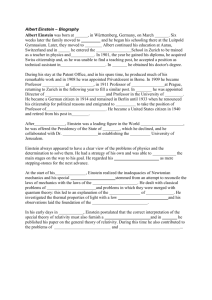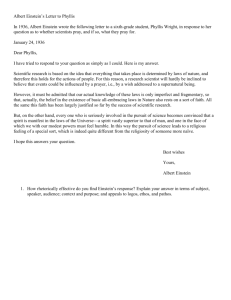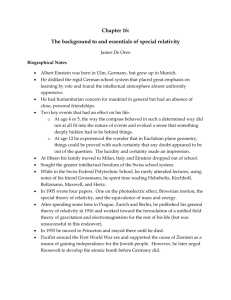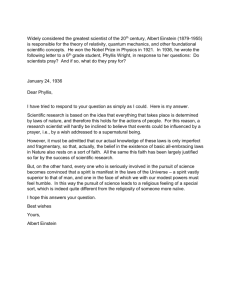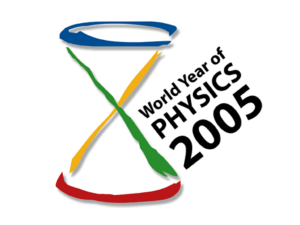Albert Einstein
advertisement
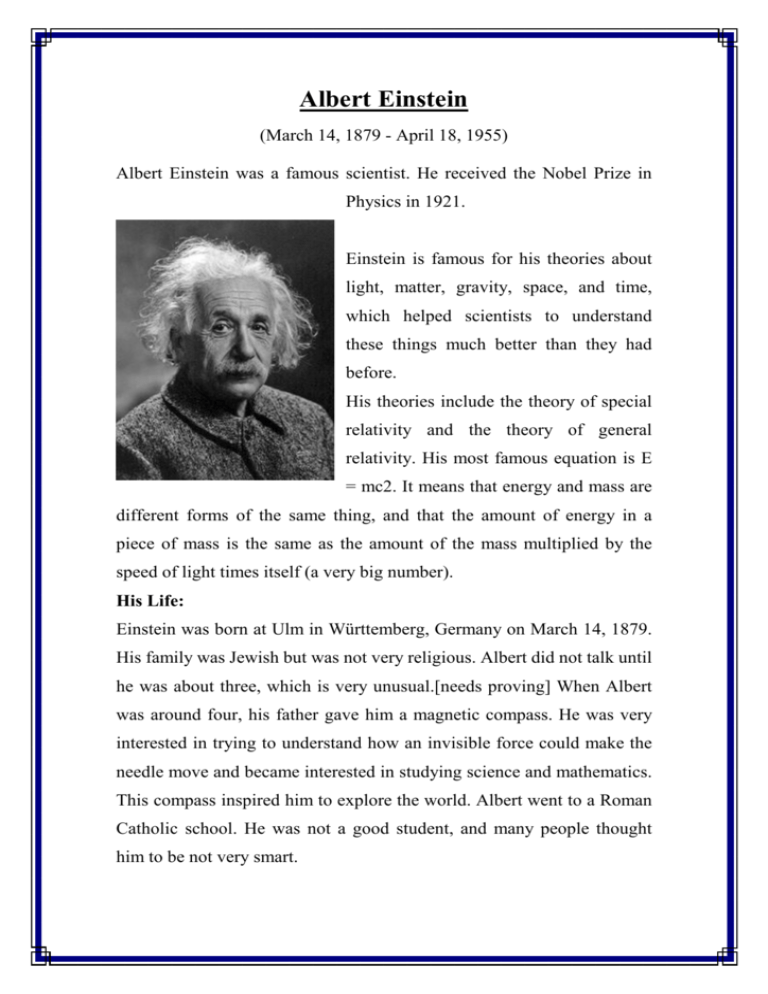
Albert Einstein (March 14, 1879 - April 18, 1955) Albert Einstein was a famous scientist. He received the Nobel Prize in Physics in 1921. Einstein is famous for his theories about light, matter, gravity, space, and time, which helped scientists to understand these things much better than they had before. His theories include the theory of special relativity and the theory of general relativity. His most famous equation is E = mc2. It means that energy and mass are different forms of the same thing, and that the amount of energy in a piece of mass is the same as the amount of the mass multiplied by the speed of light times itself (a very big number). His Life: Einstein was born at Ulm in Württemberg, Germany on March 14, 1879. His family was Jewish but was not very religious. Albert did not talk until he was about three, which is very unusual.[needs proving] When Albert was around four, his father gave him a magnetic compass. He was very interested in trying to understand how an invisible force could make the needle move and became interested in studying science and mathematics. This compass inspired him to explore the world. Albert went to a Roman Catholic school. He was not a good student, and many people thought him to be not very smart. - --.. When he became older, he went to a school in Switzerland. After he graduated, he got a job in the patent office there. While he was working there, he wrote the papers that made him famous as a great scientist. Einstein had two heavily-disabled children with his first wife Mileva. His daughter 'Lieseral' (her real name may never be known) was born about a year before their marriage in January 1902.[1] She spent her very short life (believed to be less than 2 years) in the care of Serbian grandparents where it is believed she died from Scarlet Fever.[2] Some believe she may have been born with the disorder Down syndrome but it has never been proven. Her very existence only became known to the world in 1986 when a shoe-box was discovered by Einstein's grand-daughter in an attic in California containing 54 love letters (mostly from Einstein) exchanged between Mileva and Einstein from late 1897 to September 1903. [3] Eduard Einstein was diagnosed at age 7 with a severe mental illness spending decades in hospitals, dying in the Zurich sanitorium in 1965. Einstein's brain was found severely unusual for a genius. Geniuses' brains are around 1500 to 1600 cm³.[needs proving] There is an indirect connection between brain size and the size of the neopallium especially important for the brain's higher functions. However, Einstein's brain weight was below-average and showed further signs of degeneration (e.g. Sylvian fissure). In 1917, Einstein became very sick with an illness that almost killed him. His cousin Elsa Lowenthal then nursed him back to health. After this, Einstein divorced Mileva, and married Elsa on June 2, 1919. Just before the start of World War I, he moved back to Germany, and became director of a school there. He lived in Berlin until the Nazi - --.. government came to power. The Nazis hated people who were Jewish or who came from Jewish families. They accused Einstein of helping to create "Jewish physics," and German physicists tried to prove that his theories were wrong. In 1933, under death threats from the Nazis and despised by the Nazicontrolled German Press, Einstein and Elsa moved to the United States to Princeton, New Jersey after feeling the heat of Nazi Germany and in 1940 he became a United States citizen. During World War II, Einstein and Leó Szilárd wrote to the U.S. president Franklin D. Roosevelt, to say that the United States should invent an atomic bomb before the Nazi government could invent one first. He was not part of the Manhattan project, which was the project to create the atomic bomb. He was the only one that signed the letter. Einstein died on April 18, 1955 of a burst aorta heart disease. He was still writing about quantum physics hours before he died. Many scientists only care about their work, but Einstein also spoke and wrote often about politics and world peace. He liked the ideas of socialism and of having only one government for the whole world. He also worked for Zionism, the effort to try to create the new country of Israel. Einstein's family was Jewish, but Einstein never practiced this religion seriously. He liked the ideas of the Jewish philosopher Baruch Spinoza and also thought that Buddhism was a good religion.[needs proving] - --.. Even though Einstein thought of many ideas that helped scientists understand the world much better, he disagreed with many scientific theories that were developed later in his life. Many scientific theories discuss things that we cannot know for certain, but only as probabilities. Einstein did not like these kinds of theories; he thought that it should be possible to understand anything, if we had the correct theory. He once said, "I do not believe that God plays dice with the Universe." Because Einstein helped science so much, his name is now used for several different things. A unit used in photochemistry was named for him. It is equal to Avogadro's number multiplied by the energy of one photon of light. The chemical element Einsteinium is named after the scientist as well.[4] In slang, we sometimes call a very smart person an "Einstein." One of his inspiring sayings is "There are two ways to live your life, one is as though nothing is a miracle, the other is as though everything is a miracle." There is still a strong criticism of Einstein. Ronald William Clark says that Einstein hated Germany and the Germans since his youth. G.O.Mueller wrote a whole encyclopedia refuting Einstein's relativity. G.O.Mueller, Aristotle, Kant, Leibniz say space and time are categories of perception, not distortable "things", and not joined together.The speed of light could be higher. Paul Dirac and others thought that constants can change over time, too (e.g. gravitation). G.O.Mueller lists about 4000 Einstein-critical works since 1905, rallying worldwide for rethinking relativity. - --..

